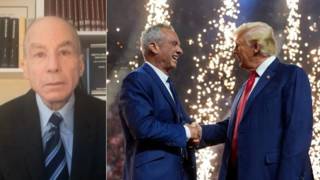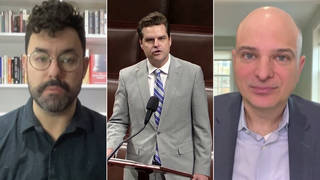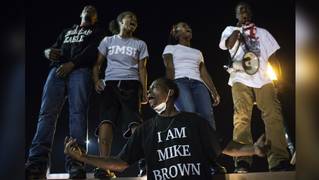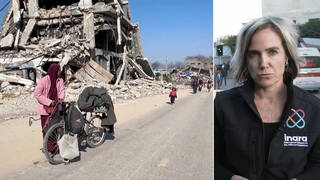
Related
Guests
- Steven Hawkinsexecutive director of Amnesty International USA. He’s also worked as an attorney with the NAACP Legal Defense Fund, where he represented African-American men facing the death penalty throughout the Deep South of the United States.
After a week that saw a militarized police crackdown and the imposition of a nighttime curfew, Amnesty International USA has taken an “unprecedented” step by sending a 13-person delegation to monitor the developments in Ferguson, Missouri. It is the first time the Amnesty organization has deployed observers inside the United States. We speak to Steven Hawkins, executive director of Amnesty International USA.
Transcript
AMY GOODMAN: This is Democracy Now!, democracynow.org, The War and Peace Report. I’m Amy Goodman. As we continue to look at the situation in Ferguson, Missouri, we’re joined by the executive director of Amnesty International USA, which has taken an unprecedented step in sending a 13-person delegation to monitor the developments in Ferguson. Amnesty has never before deployed observers inside the United States.
We’re joined here in our New York studio by Steven Hawkins, who has also worked as an attorney with the NAACP Legal Defense Fund, where he represented African-American men facing the death penalty throughout the Deep South in the United States.
Welcome to Democracy Now!, Steven.
STEVEN HAWKINS: Pleasure to be here.
AMY GOODMAN: Talk about this decision.
STEVEN HAWKINS: Well, Amnesty saw a human rights crisis in Ferguson, and it’s a human rights crisis that is escalating. We sent observers down because there was a need for human rights observers. Clearly there are violations of international human rights law and standards, in terms of how the policing is being done on protests. So, for example, we’ve issued reports on, for example, Israel and the Occupied Territories, how tear gas is supposed to be administered—never in an indiscriminate way where children and the elderly could be subject to very harmful effects, even death, from tear gas. So, we sent down observers to be on the ground. We have been thwarted in our efforts to be able to go out on curfew with the police, which would be a clear standard in these circumstances, as well as the opportunity for the press to be able to be in the space. So, we also went down to make sure that the citizens in Ferguson understood that the eyes of the world were watching, that Amnesty is deeply supportive, and we will be continuing to monitor the situation.
AMY GOODMAN: Your sense of the curfew? Do you support this curfew, or are you troubled by this curfew?
STEVEN HAWKINS: Very troubled by the curfew. That is an example, Amy, of the police going beyond what would be acceptable in international standards. The curfew—you know, we have criticized regimes around the world for imposing curfews and states of emergency in response to peaceful protests. And a few looting incidents would be—the response of a curfew was disproportionate to what the police were facing. But now it’s become more than—and the reason why you don’t respond in that fashion is exactly what we’re seeing now. It becomes a fait accompli, because now it is causing an escalation of the conflict.












Media Options